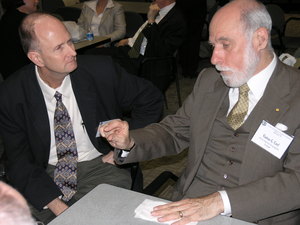-- DoE Office of Science: $62.5 million for Basic Energy Sciences, Fusion
Energy Sciences including partial funding of ITER, High-Energy Physics, and
Nuclear Physics
-- NSF: $22.5 million for research and grants
-- NSF Education and Human Resources programs: $40 million for
scholarship and fellowship programs
In addition to the COMPETES-related agencies, funding was also provided
for:
-- NASA: $62.5 million to bolster science accounts that have been
strained in recent years to pay for the return to flight of the Space
Shuttle after the Columbia disaster
-- NIH: $150 million for program spending
The supplemental bill did not provide funding for the National Institute of
Standards and Technology (NIST), another COMPETES agency.
SPIE members and leadership have been working with other scientific and
engineering societies and industry and Congressional leaders in advocating
for healthy budgets for science and engineering research and education.
In May, the Engineering R&D Symposium on Capitol Hill in Washington, DC,
convened leaders of the U.S. engineering community to discuss priorities
for science and technology leadership. Intel chairman Craig Barrett told
the group that "We have debated long enough: now it's time to act on
science and energy needs."
SPIE was a cosponsor of the R&D symposium, held in conjunction with the
National Academy of Engineering Convocation and American Association of
Engineering Societies awards dinner. The Society was represented by SPIE
President Kevin Harding of GE Global Research, Past President Brian Culshaw
of Strathclyde University, Board Member Kristina Johnson of Johns Hopkins
University, and CEO Eugene Arthurs.
Barrett's message was reiterated by other association as well as
Congressional speakers at the R&D event, who called for:
-- funding of the America COMPETES Act and increased federal funding for
basic scientific and engineering research
-- reform of U.S. visa and immigration policies to facilitate scientific
exchange and recruitment of top talent
-- more emphasis on science, technology, engineering, and mathematics
(STEM) education
-- commitment to development of clean energy sources
In addition to letters and individual visits, SPIE members also have sought
funding support in Washington during Congressional Visits Day in March, at
a STEM education caucus sponsored by SPIE in April, and through sessions of
the Council of Scientific Society Presidents last fall.
An action agenda issued in December by ASTRA (The Alliance for Science and
Technology Research in America) titled "Riding the Rising Tide: A 21st
Century Strategy for U.S. Competitiveness and Prosperity" outlines specific
policy recommendations aimed at strengthening the innovation environment in
the U.S. Read the report, funded in part by SPIE, at
http://usinnovation.org/pdf/ASTRARisingTide121107.pdf.
The ARISE ("Advancing Research In Science and Engineering") report issued
in June by the American Academy of Arts and Sciences reiterated the message
that programs and policies that support early-career investigators and
high-risk, high-reward research are needed in order to preserve U.S.
leadership in science and technology.
For more detailed reports from SPIE on U.S. public policy, see
http://spie.org/x23266.xml.
About SPIE
SPIE is an international optics and photonics society founded in 1955
advancing light-based technologies. Serving the interests of its more than
188,000 active constituents representing 138 different countries, SPIE acts
as a catalyst for collaboration among technical disciplines for information
exchange, continuing education, publishing opportunities, patent precedent,
and career and professional growth. As the organizer and sponsor of
approximately 25 major conferences and education programs annually in North
America, Europe, Asia, and the South Pacific, SPIE provides publishing,
speaking, and learning opportunities on emerging technologies. For more
information, visit http://SPIE.org.
Contact Information: Media Contact Ms. Amy Nelson Tel: + 1 360 685 5478
